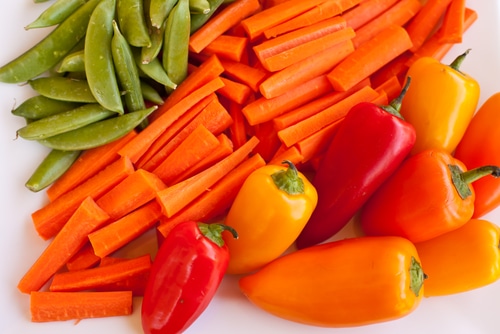
Breast Cancer and Carotenoids: Is There a Link?
This study, a collaboration between researchers at Harvard Medical School and Brigham and Women’s Hospital, looked at blood levels of carotenoids in over 3,000 people with breast cancer and almost 4,000 healthy women without the disease. Here’s what they found:
The women with higher levels of carotenoids, abundant in vegetables and some fruits, were less likely to be diagnosed with breast cancer compared to those with the lowest levels. While this doesn’t prove cause and effect, it’s supportive of a prior study showing that higher veggie consumption was linked with a lower risk for recurrence of breast cancer in women who had already been diagnosed.
Another study earlier this year showed that women with breast cancer who ate diets high in cruciferous vegetables like broccoli and cabbage had a greater chance of surviving breast cancer. Just as vegetables work their magic for heart health, they may lower a woman’s risk for breast cancer and reduce the risk for breast cancer recurrence in women who already have it.
Why Might Carotenoids Be Protective?
How do carotenoids work their magic? A portion of carotenoids like beta-carotene is converted to vitamin A once they’re absorbed. Vitamin A is intimately involved in the regulation of cell growth and replication and may keep tumor cells in check by blocking their ability to grow and replicate uncontrollably. Plus, carotenoids are powerful antioxidants that protect cells against oxidative damage that can lead to malignancies. Carotenoids also impact immunity, and a healthy immune system is important for defending against all types of disease, including cancer.
What Are the Best Sources of Carotenoids?
The most obvious sources are orange veggies like carrots, sweet potatoes, and winter squash, but many green vegetables are also rich in natural carotenoids, although their orange color is less apparent due to their high chlorophyll content.
Some of the best “green” sources of carotenoids include kale, Swiss chard, spinach, watercress and leafy greens of all types. Broccoli is not only a good source of carotenoids, but it also contains other natural chemicals like sulforaphanes and indoles that have anti-cancer properties. Indoles seem to offer protection against estrogen-dependent breast tumors by their effect on estrogen. They convert more powerful estrogens to weaker ones that are less likely to stimulate breast tissue. No wonder they call broccoli a super-veggie!
Some fruits that are good sources of carotenoids include cantaloupe, apricots, mangos, and goji berries.
Get Your Carotenoids Naturally From Foods
There’s no evidence that carotenoid supplements offer the same benefits as natural carotenoids. In fact, carotenoid supplements have been linked with an increased risk of lung cancer in smokers. It’s difficult to isolate out a single nutritional component, place it into a supplement and expect it to have the same health benefits as that found in foods. Carotenoids work in synergy with other components in fruits and vegetables to exert their protective benefits. Think spinach – not supplements!
The Bottom Line?
Now you have another reason to add orange and green to your plate. Skip the white potatoes and rice and serve sweet potatoes and green vegetables instead. Then bite into a piece of cantaloupe for dessert instead of a cookie. It’s a small change that could make a difference in your risk for getting breast cancer.
References:
J Natl Cancer Inst (2012) doi: 10.1093/jnci/djs461
Science Daily. “Eating Cruciferous Vegetables May Improve Breast Cancer Survival”
Journal of the National Cancer Institute, Vol. 88, No. 21, November 6. 1996.
European Journal of Nutrition 2008;47 Suppl 2:73-88.
Related Articles By Cathe:
Is It Ever Too Late to Get the Health Benefits of a Healthy Diet?
Metabolic Health May Be More Important Than Body Weight for Breast Cancer Risk
What Percentage of Cancers Are Preventable Through Lifestyle?

